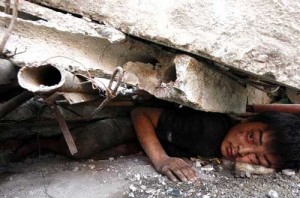
It amazes me how some people are stripped of their rights to use the Internet or certain western media sources through the World Wide Web. In modern society, when a disaster hits, social media and the Internet play key roles in distributing updates and developing information on the event to a global audience.
On May 12th, 2008 an Earthquake struck the Sichuan Province, one of China’s most popular provinces, killing over 69,000 people. This devastation wasn’t immediately reported to the rest of the world, as many western news outlets such as Facebook, You Tube, and Twitter are banned in China. In an article written by Malcolm Moore in the Telegraph (a UK newspaper), he explains that the Chinese government needed to “relax its reporting restrictions” as 29 journalists, 19 of whom are bloggers, are in prisons. If they had not been in prisons, word about the quake would have travelled much faster making it easier for medical teams to respond to the catastrophe (along with many other things).
Despite China’s extremely up-tight Internet laws, sites like Tweetburner and TwitterLocal, both completely un-related to the banned site Twitter, made it possible for people across the world to search topics such as the earthquake. Most reports weren’t in English, forcing many to use GoogleTranslate. Another website was key in providing the public with information, as American blogger Robert Scoble tweeted “lots of people saying summize.com is best search for quake info” (summize.com was a site for reviews and blog discussions that was bought out by Twitter). A weblog based in Shanghai called Shanghaiist posted videos and pictures of the earthquakes and posted them online through massive Chinese file-sharing sites such as Tudou, where by September 2007 served over 55 million videos every day.
This event was the first disaster where social media played a significant role. Others would follow, such as the Arab Spring two years after the earthquake, which led to leaders in many countries such as Egypt, Tunisia, and Lybia to be forced from their power. Now, countries who try to hide atrocities that occur to their populations are being exposed on Facebook and other social media outlets. The reports on the earthquake in China contributed to a breakthrough moment for new media, as many people switched from old media sources to websites like Twitter for their breaking news updates.
